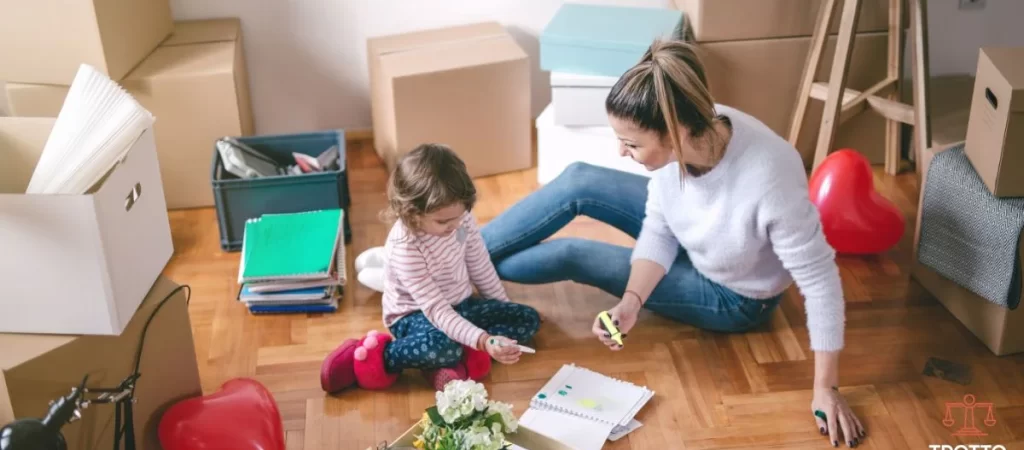Relocating with children after a divorce can be a complex and emotional journey, filled with numerous considerations and challenges. It can be hard to know how to handle relocation with children after divorce in New York. Let the lawyers at Trotto Law Firm, P.C., suggest how to make this move for your family while keeping the best interests of your children in the forefront.
Whether you’re facing custody modifications, planning for the emotional impact on your child, or simply looking to ensure a stable environment, it is important that parents have resources that provide them with clarity and support to navigate this time with care and confidence. A proactive approach is essential to help mitigate any fears or uncertainties a child may have about the move.
Beyond the legal considerations that are important, a move’s impact on a child can disrupt their sense of stability and affect their education, social conditions, and emotional well-being. As parents, it is essential to continuously evaluate how the new location is affecting their lives and, if there are negative impacts, that they address these issues efficiently.
Considerations for Relocation With Children After Divorce
Handling relocation with children after a divorce involves careful planning, legal compliance, and sensitivity to your children’s needs. Below is guidance to help you manage this transition well:
- Understand legal requirements. Examine your custody agreement or court order to understand any restrictions or requirements related to relocation. Consult with a family law attorney to understand your rights and obligations. Ensure that you have provided the other parent with written notice of your intention to move with the necessary details.
- Develop a relocation plan. Propose a realistic visitation schedule that allows the other parent to maintain a meaningful relationship with the child. Decide on transportation logistics and costs. Be clear on who is responsible for arranging and paying for travel. Establish a communication plan for regular engagement between the child and non-relocating parent.
- Focus on the best interests of the child. Research educational opportunities, healthcare providers, and social and emotional support that will positively impact the children. Ensure their needs are cared for before the move, if possible.
- Prepare your child for the move. Talk to your child openly about the move in an age-appropriate manner. Address their concerns and answer their questions honestly. Involve them in the process of making divisions as much as possible. Reassure them that both parents love and support them.
- Maintain a positive co-parenting relationship. Work cooperatively with the other parent to address any issues that come up. Be flexible with visitation schedules and willing to make adjustments as needed. Address conflicts calmly and constructively and seek mediation or professional help if necessary.
- Plan for a transition period. Transitions are hard on everyone but can be especially challenging for children. Help them through this transition by creating new routines and traditions to help your child feel secure and settled. If possible, visit the new location with your child before the move. Familiarizing them with their new school, neighborhood, and community can be helpful in facilitating a smooth transition.
By carefully considering legal requirements, focusing on your child’s best interests, and maintaining open communication and cooperation with the other parent, you can manage the relocation process effectively and support your child’s well-being throughout the transition.
FAQs
Can a Mother Move a Child Away From the Father After Divorce?
Whether a mother can move a child away from the father after divorce depends on several factors, including the terms of the custody arrangement and whether the move is in the child’s best interest. If the mother has primary custody or joint custody, she may need to seek permission from the court before moving.
The court will evaluate if the move is in the child’s best interest and whether it will impact the father’s visitation rights or the overall custody arrangement.
How Do I Win a Relocation Custody Case in New York?
To win a relocation custody case involves demonstrating that the move is in the child’s best interests while addressing any potential concerns raised by the other parent. To prepare a strong case, the parent needs to show how the move will benefit the child’s education, health, and overall quality of life. The parent can show evidence such as job offers, better schools, and improved living conditions.
By presenting a comprehensive relocation plan that includes the details of the move and new living accommodations, a parent has a better chance of showing the court this is a viable plan.
How Does Co-Parenting Work in Two Different States?
How co-parenting works in two different states can be challenging to determine but is manageable with careful planning and communication. A primary resource needed for this to work includes a detailed parenting plan. Creating a clear schedule that outlines when the child can visit each parent and considers school breaks, holidays, and summer vacations can ensure fair and consistent time for the child with both parents.
Effective co-parenting across state lines requires commitment, organization, and communication aimed at prioritizing the child’s needs.
How Do You Decide to Relocate Your Family After Divorce?
How to decide to relocate your family after a divorce is a significant decision that involves multiple considerations unique to each family’s situation. Factors that can help in making this decision are assessing your unique reasons for relocating, whether it is for employment, increased family support, quality of life, health, and education.
It is important to understand how these details will impact children and if it will be an ultimately positive or negative change that impacts their lives.
Speak With a Trusted Family Law Attorney Today
Relocating with children after a divorce presents unique challenges, but with thoughtful planning and clear communication, it can be navigated smoothly. Ensuring that the move aligns with your children’s best interests, addressing legal considerations, and maintaining open lines of communication with the other parent are crucial steps in this process. A family law attorney at Trotto Law Firm, P.C., is available to help. Set up a consultation today to get more information.






